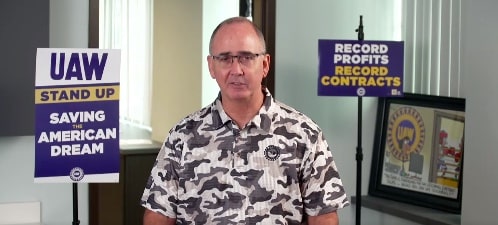United Autoworkers President Shawn Fain on Friday made good on a vow to extend the UAW’s strike if no “serious progress” is made with the Big Three automakers.
During a livestream event Friday, Fain said that UAW workers at 38 parts distribution facilities across 20 states would strike effective at noon ET at General Motors and Stellantis plants.
Fain said Ford would not be part of the extended walkout because the union has, in fact, made serious progress with that automaker. He said Ford’s come to the table over sticking points like profit-sharing, pay-tier structures and temporary employment—though the UAW president added that there is still more ground to covered with Ford.
“UAW members and the working class are ready to stand up against corporate greed and stand up for our communities,” Fain said during the livestream event.
The UAW’s strike began at midnight last Friday when contract agreements to cover the union’s 145,000 members could not be reached, leading to the first-ever nationwide UAW strike being called simultaneously at all of the Big Three automakers in Detroit.
Nearly 13,000 UAW members walked out at three plants last Friday: General Motors in Wentzville, Missouri; Ford in Wayne, Michigan; and Stellanits in Toledo, Ohio.
Stellantis builds vehicles under the Jeep, Ram, Dodge and Chrysler brands for North America.
The key issues reportedly remain hourly pay, retirement benefits, cost-of-living adjustments, wage progression and work-life balance.
The Big Three automakers have proposed roughly 20% raises over the four-and-a-half year term of their proposed deals, though that is only half of what the UAW is demanding. The UAW at one point during the talks offered to lower its demand to 36%.
The automakers have asserted that record wage increases of around 20% over the length of the contract would amount to a top wage of more than $39 per hour for a majority of workers. Sources tell CNBC that if the Big Three do increase wages beyond the 20% ceiling, they’re likely to lower other benefits or reduce employment in the future to compensate.
Last Friday, President Biden, who touts himself to be the most union-friendly President in U.S. history, urged the automakers to ensure that workers are given their “fair share” of the “record corporate profits” the Big Three have enjoyed in recent years.
Profits at the Big Three collectively increased by about 92% in the last decade, according to recent analysis from the Economic Policy Institute. CEO pay rose by about 40 percent in the same period.


